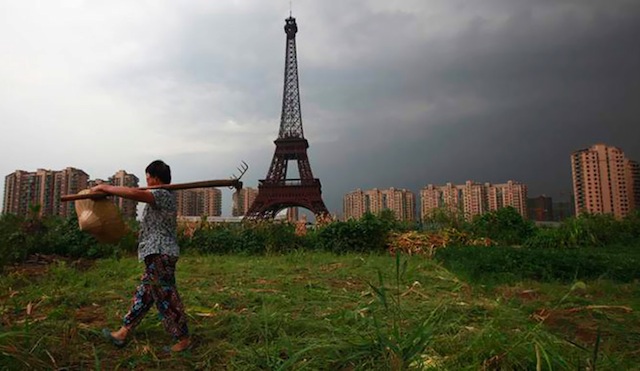
China is the big new player on the global economic scene. They are now on track to pass America as the leading economy in 20 years, but how have they been able to have such growth? One answer lies in Real estate. Over the last few years, construction has accounted for 13% of the country’s GDP. However this number is very misleading because property constructions, not sales are what factor into the 13% GDP number. This fact has led to wild land speculation and a voodoo economic vibe of build now, sale later. With such numbers, one must worry if China is headed towards a similar economic crash as America’s in 2008.
For an example of this, one needs to head no further then China’s fake Paris. Thirty minutes outside of Shanghai, the almost exact replication of Paris is little more then a tourist attraction. As of today the, 1 billion dollar city is only at 2% of its capacity with little to no development outside of the tourist who come to see the oddity.
This city is not alone, as many as thirteen cities in China over the past ten years have succumb to the same fate. Each ghost city follows a similar pattern. The city is beautifully designed and planned, but are placed in the middle of nowhere. Demand does not follow the supply and the city remains half finished and vacant. Despite the old adage, sometimes if you build it, they won’t come.
I also foresee a potential crash, or at a minimum some serious turbulence, in China’s future as a result of this speculation and lack of accountability in real estate development. The “build now, sell later” mentality that artificially inflates GDP figures reminds me of shady accounting practices, like Enron’s mark-to-market accounting, that are used to artificially inflate revenues on financial statements. Not only do these ghost towns look eerie and off-putting, but a consideration of the potential economic backlash of their existence is quite unsettling as well.
Is there is any data on who comprises the 2% that has moved into the fake Paris. Demographic characteristics, on who is moving into the cities in the middle of nowhere, interest me because as we know China is controlling the migration of farmers from rural areas to cities. There are millions of Chinese without real homes. It’s not that the desire for homes isn’t there but that these new homes are way out of reach economically for common Chinese citizens. What is the Chinese government doing to promote affordable housing if any? Is there any pieces of this that we are missing if we want to analyze how the real estate question will play out in China?
We’ll read about one such city in Miller’s China’s Urban Billion. Some will surely fail, but others are in sensible locations, and (with hindsight) were merely built too soon.
As to GDP, construction does add to GDP – workers get paid. The question is the extent to which it is sustainable, and (if cities remain empty) whether gains would have come from investment elsewhere. Think about how we could make those queries more precise.
I also agree with the ones who think China might soon go through what America went through. As more and more “ghost towns” are built for mainly entertainment purposes, this might be “over-investment” that can lead to the housing bubble or a similar problem. The question is now: can China handle this situation?
I think many of the Chinese provinces are trying to lower their growth rates that might slow down the investment but I am not sure how it will help the Chinese government to handle the problem.
China can certainly avoid a housing/construction crisis if it undertakes the responsible structural changes to deincentivize “useless” development projects while shifting capital from construction to public services, clean energy, and other industries. Right now, construction comprises far too large a component of GDP and is obviously an “answer in search of a question,” so to speak. See my post on China’s growth slowdown for another perspective on this phenomenon.
[…] With regards to construction and housing developments (which, as Andrew noted in an earlier post, may be leading to a housing bubble), he chastened that “the central government should act on […]